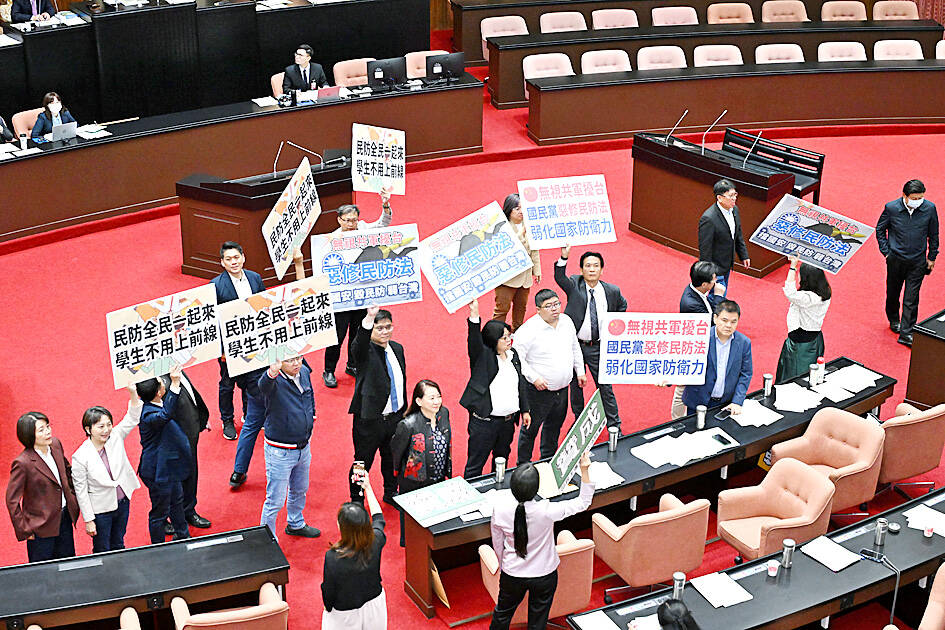The Chinese Nationalist Party (KMT) caucus yesterday declined to back one of its member’s proposal to amend the Civil Defense Act (民防法), sending the bill back to the Procedure Committee in a surprise win for the Democratic Progressive Party (DPP).
KMT Legislator Hsu Chiao-hsin (徐巧芯) on Tuesday sponsored an amendment to strike out all references to military tasks and students in the law, citing a need to prevent children from being drafted into service.
DPP lawmakers at the time said the KMT proposal would have gutted the civil defense program’s ability to perform any tasks related to national defense.

Photo: Chen Yi-kuan, Taipei Times
They yesterday motioned to remove the proposed amendments from the legislature’s agenda, to which the KMT quickly objected, seemingly setting the stage for a floor vote that the latter was sure to win.
DPP members filtered to the central aisle of the legislative chamber in readiness to mount a protest as legislators began to vote on the motion.
However, KMT caucus whip Lin Tzu-ming (林思銘) abruptly declared that his party had no objection to the DPP motion seconds before the vote was to be tallied, to the visible confusion of lawmakers present.
In response, the KMT lawmakers withdrew their objections, while the Taiwan People’s Party’s eight members, seemingly caught by surprise, became the only legislators to vote “no” to shelve the bill.
DPP caucus chief executive Rosalia Wu (吳思瑤) said before the vote from the sidelines of the meeting that the KMT hoped to undermine national security under the pretext of protecting students.
KMT rhetoric bore an uncanny resemblance to Beijing’s propaganda about President William Lai’s (賴清德) civil defense initiative, especially the Taiwan Affairs Office’s false claims that 400,000 Taiwanese would be conscripted, she said.
Separately, the Legislative Yuan yesterday passed a proposed legal change to broaden eligibility for urban renewal subsidies to replace old, vulnerable buildings with earthquake-resistant structures.
The amendment to the Urban Renewal Act (都市更新法) is headed to Lai’s desk.
The measure would allow structures dating from before the government’s implementation of floor area ratio controls to qualify for subsidized reconstruction, Minister of the Interior Liu Shyh-fang (劉世芳) said in a news release.
Structures created before floor area regulations tend to lack quake resistance and are oversized, he said, adding that the subsidies have the aim of incentivizing their replacement.
The amended act would retroactively apply to urban renewal projects submitted to local governments before the date of promulgation, he said.
The government continues to work toward improving the safety margins of the nation’s buildings, he said, adding that the 1999 Jiji earthquake and the powerful tremor earlier this year evidenced this task’s importance.
In addition, KMT lawmakers passed through the second reading for an investigative committee on alleged corruption linked to Taiwan’s green energy program on the grounds that local renewable energy prices are higher than the international average.
The nation’s renewable energy policies have resulted in deforestation and jeopardized aquafarmers’ livelihoods in some cases, they said, before accusing the government of cutting corners and showering favors on contractors.
The KMT caucus cited the controversial amendments to the Act Governing the Legislative Yuan’s Power (立法院職權行使法) as its mandate.

Chinese Nationalist Party (KMT) Chairman Eric Chu (朱立倫), spokeswoman Yang Chih-yu (楊智伃) and Legislator Hsieh Lung-chieh (謝龍介) would be summoned by police for questioning for leading an illegal assembly on Thursday evening last week, Minister of the Interior Liu Shyh-fang (劉世芳) said today. The three KMT officials led an assembly outside the Taipei City Prosecutors’ Office, a restricted area where public assembly is not allowed, protesting the questioning of several KMT staff and searches of KMT headquarters and offices in a recall petition forgery case. Chu, Yang and Hsieh are all suspected of contravening the Assembly and Parade Act (集會遊行法) by holding

PRAISE: Japanese visitor Takashi Kubota said the Taiwanese temple architecture images showcased in the AI Art Gallery were the most impressive displays he saw Taiwan does not have an official pavilion at the World Expo in Osaka, Japan, because of its diplomatic predicament, but the government-backed Tech World pavilion is drawing interest with its unique recreations of works by Taiwanese artists. The pavilion features an artificial intelligence (AI)-based art gallery showcasing works of famous Taiwanese artists from the Japanese colonial period using innovative technologies. Among its main simulated displays are Eastern gouache paintings by Chen Chin (陳進), Lin Yu-shan (林玉山) and Kuo Hsueh-hu (郭雪湖), who were the three young Taiwanese painters selected for the East Asian Painting exhibition in 1927. Gouache is a water-based

Taiwan would welcome the return of Honduras as a diplomatic ally if its next president decides to make such a move, Minister of Foreign Affairs Lin Chia-lung (林佳龍) said yesterday. “Of course, we would welcome Honduras if they want to restore diplomatic ties with Taiwan after their elections,” Lin said at a meeting of the legislature’s Foreign Affairs and National Defense Committee, when asked to comment on statements made by two of the three Honduran presidential candidates during the presidential campaign in the Central American country. Taiwan is paying close attention to the region as a whole in the wake of a

OFF-TARGET: More than 30,000 participants were expected to take part in the Games next month, but only 6,550 foreign and 19,400 Taiwanese athletes have registered Taipei city councilors yesterday blasted the organizers of next month’s World Masters Games over sudden timetable and venue changes, which they said have caused thousands of participants to back out of the international sporting event, among other organizational issues. They also cited visa delays and political interference by China as reasons many foreign athletes are requesting refunds for the event, to be held from May 17 to 30. Jointly organized by the Taipei and New Taipei City governments, the games have been rocked by numerous controversies since preparations began in 2020. Taipei City Councilor Lin Yen-feng (林延鳳) said yesterday that new measures by